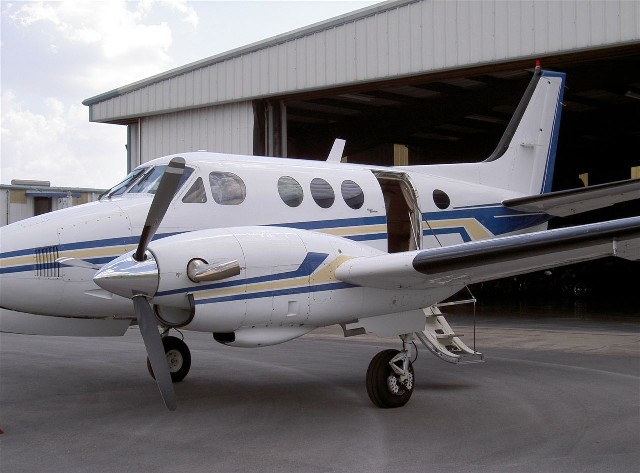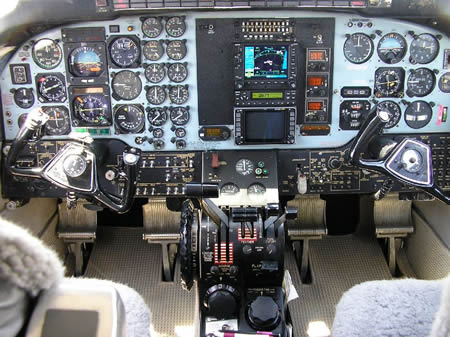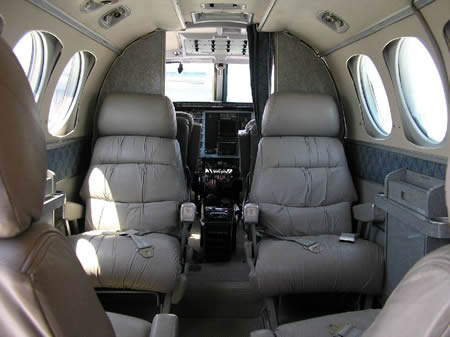


Aircraft Description
Background/History
The first Beechcraft 65-90 accomplished its maiden flight in January 1964. Based on the piston-engined Model 65 Queen Air, the -90 featured the then-new Pratt & Whitney Canada PT6A turboprop powerplants in place of the earlier 65’s Lycoming IGSO-480-A1E6 flat six piston engines. A pressurized model was soon developed, and was designated the King Air 90. Many variants followed including the PT6A-20-powered A90 and B90, and the C90 powered by the -21 variant of the PT6A. The C90A, introduced in 1984, incorporated an improved cowling design for more efficient air induction and reduced drag, an updated three-bus electrical system, hydraulically actuated landing gear, faired exhaust stacks, and Collins Pro Line avionics installed in a new instrument panel designed to reduce single-pilot workloads. A seven-seat version of the C90A was introduced in 1987, which featured an increase in maximum takeoff weight of 450 lbs., for a total MTOW of 10,100 lbs. In 1992, after a production run of 236 aircraft, the C90A was replaced by the C90B with its four-bladed propellers and significant improvements in cabin noise levels.
Power
The King Air C90A is powered by a pair of Pratt & Whitney Canada PT6A-21 turboprop engines flat-rated at 550shp each at ISA +18C. Engine inspection interval is 3,600 hours.
Avionics
The King Air C90A featured Collins Pro Line avionics as standard equipment beginning with the 1984 model year. While many C90A’s are equipped with King avionics, a typical Collins installation will include dual VHF 20A comms, dual VIR 30A navs, dual DME 40, dual TDR 90 transponders, APS 65 autopilot, ADS 65 flight director, ADF 60 and WXR 270 CLR weather radar.
Design Features
The King Air C90A is a pressurized, twin-engine turboprop business aircraft configured as a cantilever low-wing monoplane with a conventional tail. It has hydraulically actuated retractable tricycle landing gear with a single wheel on each unit, and an airstair door on the port side aft of the wing. It utilizes dual bleed air for cabin heat and pressurization. The three-bladed propellers are full-feathering and reversible. Leading-edge pneumatic boots provide de-icing of the wing and tail surfaces.
Accomodations
The King Air C90A is found in a variety of configurations, typically six- to seven-passenger executive seating with a four-place club, a seat directly across from the airstair door, and a belted lavatory seat. The aft cabin/lavatory area has 26.5 cu. ft. of baggage space. The cabin dimensions are 4.8ft. in height, 4.5ft. in width and 12.9ft. in length.
| General | King Air C90A, BE-C90A | |||
|---|---|---|---|---|
| Category | Multiengine Turboprop < 12,500 lbs. | |||
| Years Aircraft Manufactured | 1984 – 1992 | |||
| Serial Number Range | 1063 – 1299 | |||
| Retail High Price | $1,700,000.00 / 1,333,990.00€ | |||
| Retail Low Price | $499,000.00 / 391,565.30€ | |||
| Characteristics | King Air C90A, BE-C90A | |||
| Seating | 1+7/9 | |||
| Wing Loading | 34.4 | |||
| Power Loading | 9.2 | |||
| Noise(EPNdB): Takeoff/Sideline/Approach | 74.3 | |||
| External Dimensions (ft) | King Air C90A, BE-C90A | |||
| External Length | 35.5 | |||
| External Height | 14.3 | |||
| External Span | 50.3 | |||
| Internal Dimensions (ft) | King Air C90A, BE-C90A | |||
| Internal Length (Overall/Net Height) | 12.9 | |||
| Internal Height | 4.8 | |||
| Internal Width (Max/Floor) | 4.5/4.1 | |||
| Baggage | King Air C90A, BE-C90A | |||
| External: Cu.Ft./Lb. | N/A | |||
| External: Cu.Ft./Lb. | N/A | |||
| Power | King Air C90A, BE-C90A | |||
| Engines | 2 P&WC PT6A-21 | |||
| Output (lbs ea.)/Flat Rating | 550shp/ISA+18 | |||
| Inspection Interval | 3,600t | |||
| Data based on latest manufactured year | ||||



